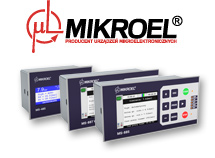Is Processing Compressor Station Data in the Cloud Risky? Learn How to Ensure Industrial Data Security.
Modern industrial facilities take numerous measures to minimize risks and protect themselves from potential threats. Safeguarding against adverse events includes not only internal organizational risks but also crisis situations that may arise from external factors. Examples include hacker attacks, IT system failures, data loss, or even power outages. More and more companies recognize that cybersecurity is a key element in protecting their operations.
To stay competitive and meet growing demands, companies must constantly innovate. Implementing new technologies, such as cloud-based solutions, introduces new threats that can significantly impact a company’s security and operational stability.
To increase control over data and operations, many companies are turning to alternative solutions such as local or hybrid systems that combine the benefits of cloud technology with the security of storing data on internal servers. Using local servers allows full control over where data is stored, who has access to it, and how it is protected. This gives the company direct influence over data security without relying solely on external service providers.
However, many enterprises—despite the advantages of local storage—still need to collaborate with external suppliers and service providers, sharing selected information. To ensure secure communication, solutions such as VPN (Virtual Private Network) are commonly used. A VPN creates a secure, encrypted connection between a device and a server, hiding the actual IP address and protecting data from unauthorized access. For this reason, it remains one of the most widely used tools for securing information transmitted beyond a company’s internal infrastructure.

Secure Monitoring and Control of Industrial Data
Most compressor suppliers base their remote monitoring systems on external clouds, which require internet access and operate outside the internal IT infrastructure. One of the innovative features of the XAIR Line controller series is the built-in Webserver, which stores and hosts data directly on the compressor controller, sharing it within the company’s internal LAN network. This approach ensures complete data isolation, eliminating the risks associated with using external clouds and servers. As a result, the company retains full control over its data and minimizes the risk of cyberattacks that could disrupt production continuity.
Secure Data Sharing
XAIR Line controllers do not exclude internet communication—instead, they enhance its security through VPN technology. This enables secure, authorized data transmission to employees in different locations and to compressor service teams, allowing for quick response in emergency situations. Additionally, XAIR Line controllers offer the ability to define the scope of shared data, allowing the information provided to be tailored to the user’s needs, which increases operational flexibility and the security of production management.
Benefits of XAIR Line Solutions
- Local Data Storage
All data is stored within the company’s infrastructure on the internal LAN, ensuring complete isolation and protection from risks associated with external clouds and servers - Internet Independence
The system continues to operate without interruption even during internet outages, ensuring uninterrupted monitoring and compressor management. - Real-Time Monitoring
Enables close tracking of key parameters such as compressor operating schedules, consumption, and downtime, allowing for effective management and process optimization. - Secure VPN Connection
The controller supports authorized VPN connections with service teams, enabling secure remote support and continuous monitoring of compressor performance. - Custom Data Sharing
Users can define the scope of data being shared, tailoring information access to specific needs and increasing control and security of data transmission. - Fast Problem Response
Remote diagnostics allow for immediate issue detection and response, minimizing downtime and supporting production continuity. - Protection Against Cyberattacks
Data isolation from the public network reduces the risk of cyber threats and enhances the security of industrial systems. - Regulatory Compliance
Local data handling supports compliance with regulatory requirements for data storage and management.

